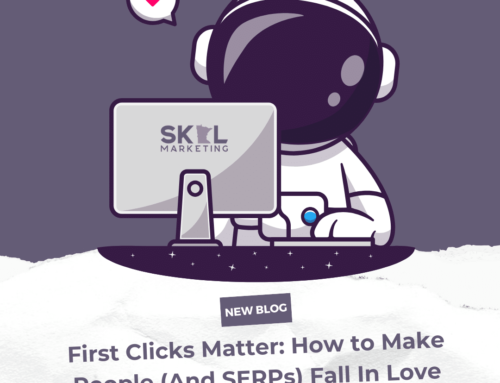Keywords occupy an interesting space in the marketing industry, in that its one of those marketing buzzwords that most people have heard, but very few know all that much about. Or maybe they do know something about keywords, but the term has been around for so long that the info has been outdated. If you’re looking to understand keyword marketing, what’s the best path? What are keywords, why are they important, and how does one go about starting a keyword strategy in 2022? Well, consider this a crash course in keyword 101:
What are keywords?
To really define what a keyword is and why it’s important first requires a bit of understanding of internet search. Search engines like Google find results by “crawling” the web–essentially, scanning every website out there for info and ranking them based on quality, speed, usability, relevance to the matter being searched for, and more.
That last one is the most important to us for today: the text on a website is how search engines know whether that site is relevant to a user’s search. Keywords are, at their core, search terms–words or phrases (a keyword can actually be made up of multiple words) that a user may type into a search engine hoping for a relevant result, and by extension that web developers may put into the text of a website in hopes of capturing that search interest.
Why are keywords important?
Website keywords are useful because they’re one of the most effective tools for search engine optimization. This process (called “SEO” for short) is how websites strategically change their content and design to influence the outcome of search engine results, with the goal–of course–being to rank closer to the top so that more people will see and click on the link. Most people intuitively know that the higher a website ranks, the more it’ll be seen, but many people are astounded to learn that in over 90% of search queries, the user never goes past the first page. That means that having strong SEO is vitally important for your website and your business.
As stated before, keywords play a huge role in this, as they’re the main way your website gets picked up in particular searches. For example, if someone Googles “best Thai food in Minneapolis,” then Google will look for websites that include keywords like “Thai food,” “Minneapolis,” and “best Thai food in Minneapolis.” If your website includes none of those, you can kiss that potential traffic goodbye. See the importance?
How do I know what keywords to use?
Knowing what keywords to include in your website seems intuitive, but often it can be anything but. It’s important to have a strong list of keywords that capture various potential searches. This should be a mix of “short tail” keywords (more general search terms that will capture a lot of traffic, but also have a lot of competition–e.g. “Thai food in Minneapolis”) and “long tail” keywords (more specific search terms that may not get as much traffic, but are more likely to produce strong leads–e.g. “Best Thai curry near US Bank Stadium”).
While it’s entirely possible for you to brainstorm a great list of potential keywords for your website, professional marketing agencies can take it a step further and generate data-driven keyword lists that show you–with numbers–the keywords to prioritize in order to get the results you want and generate the most effective leads.
Where should I use keywords in my website?
In website body copy, you want to focus on integrating your most important keywords into your most prominent text: That would be headers, subheaders, and intro paragraphs. Don’t only bury your keywords at the end of a massive text block; make sure they’re found in the most visible places on the website (in a way that reads naturally, of course–more on that in a moment). Then, as you get further down in the copy, you can integrate variations on your important keywords to try to capture a variety of different search terms.
Keywords in the body copy may be obvious, but there are other important keyword locations that may get overlooked if you aren’t a trained web developer. Places like web page titles, web page descriptions, meta-descriptions and meta-tags, image file names, image descriptions, URL names, and more. Once you know where and how to be inserting keywords, it’s not that complicated, but it can be time-consuming and you need to approach it thoroughly and with attention to detail.
How many keywords should I use?
One of the most common mistakes people make when they first start using keyword marketing on their website is overusing keywords. They pick a keyword they want to rank for, and write their website copy to incorporate it as frequently as possible. On the surface, this makes sense–if Google is crawling for particular keywords, and that word shows up a lot in your website, it’ll make Google happy, right?
Well, not quite. When search was in its infancy, this practice (known in the industry as “keyword stuffing”) could prove quite effective–sometimes you’d even see web developers stick massive blocks of keyword text into a web page, with the text the same color as the background so nobody noticed. But those days are over. As search has become more advanced, search engines have learned to detect–and punish–these practices.
Google, for example, is in the business of ranking websites that people find helpful and easy to use. This means that if you’re stuffing your website full of irrelevant keywords, or stuffing your text with so many keywords that it becomes awkward or hard to read, the search engine giant may actually penalize your site in the rankings. The best practice is to integrate important keywords and their variants into natural, creatively effective web copy that actually gives your visitors useful information without reading like it was written to please a robot.
For some people, keyword marketing can be a difficult subject to grasp as it often goes against our natural marketing instincts. For others, it comes easy, but they may not have the time to give it the attention it deserves. No matter who you are and how well you understand keyword marketing strategy, Skol Marketing’s team is here to help. For one-on-one guidance or to discuss how we can help your company find and apply the keywords that give you the best results, please don’t hesitate to contact the local SEO experts at Skol Marketing.





